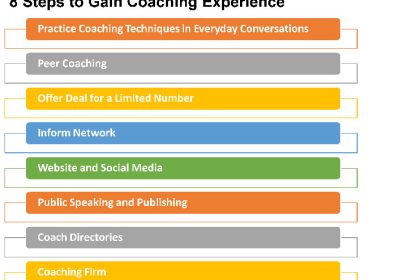
To shed light on the practical benefits of coaching in the workplace, we’ve gathered insights from seven professionals, including founders and coaches. Their experiences range from implementing mindfulness for better team dynamics to creating successful career transitions. Dive into these compelling stories and specific examples to understand the transformative power of coaching.
● Implementing Mindfulness for Better Team Dynamics
● Providing a Transformative Impact on Performance
● Boosting Confidence and Innovation
● Self-Coaching and Training Enhances Employee Satisfaction
● Improving Time Management and Prioritization
● Facilitating a Positive Mindset Shift
● Creating Successful Career Transitions
Implementing Mindfulness for Better Team Dynamics
As a life coach, I once worked with a project manager at a large company who often felt overwhelmed by work stress, hierarchy pressure, and frequent friction within his team. We implemented mindfulness exercises like daily 10-minute meditation, breathing, and emotion-labeling techniques, gradually reducing his stress levels and better managing his workload.
Over time, we began incorporating these practices into his own team meetings. For instance, we introduced a “Mindfulness Check-in” at the start of each meeting, where team members shared their current emotional state or feelings, promoting openness and empathy. This improvement in team dynamics led to fewer conflicts and a more harmonious, supportive work environment.
Bayu Prihandito, Psychology Expert, Life Coach, Founder, Life Architekture
Providing a Transformative Impact on Performance
Coaching is highly valuable in the workplace as it enhances employee performance, develops leadership skills, and fosters a positive work culture. Witnessing firsthand the transformative impact of coaching on a team is a powerful experience.
One particular story stands out about a coach who was assigned to work with a struggling employee. They were having difficulty managing stress and lacked confidence in their abilities. Through regular coaching sessions, the employee gained self-awareness, learned effective stress management techniques, and developed stronger communication skills.
This not only improved their individual performance but also positively influenced the team dynamics. The employee became more engaged, motivated, and productive, leading to increased overall team performance and a happier work environment. Coaching, therefore, has proven to be a powerful tool in unlocking potential, driving growth, and cultivating a high-performing workforce.
Brian Clark, Founder, United Medical Education
Boosting Confidence and Innovation
In early 2013, we brought on a young associate. He was sharp and innovative but hesitated when it came to expressing his ideas. We implemented a coaching program, pairing him with a senior team member.
As weeks turned to months, I saw Adam transform. His confidence soared as he had someone to provide direction, bolster his abilities, and give constructive feedback. In one memorable team meeting, Adam presented a novel strategy for reputation repair that later proved to be incredibly successful.
This change, I attributed largely to coaching. It didn’t just equip Adam with skills, it reassured him that he was capable and valued, fostering confidence that became contagious within the team.
Alexandru Contes, Co-Founder, ReviewGrower
Self-Coaching and Training Enhances Employee Satisfaction
Back when I was starting from scratch in the finance industry, I didn’t have a boss who resembled a coach. But I eventually realized the power of coaching and decided to become my own coach. I challenged myself, set ambitious goals, and adopted a positive mindset.
Now, in my company, when employees are promoted to management level, they undergo coaching training. Current managers also receive yearly coaching and refresher training. It makes a significant difference when managers know how to relate to, and especially listen to, their subordinates.
What this entails for us is employee satisfaction. In fact, turnover at Moneyzine is next to nothing because I believe in my team, and they believe in me. If we need an extra tech to tackle a project, no problem! We know we can count on every team member to step up, and they’re happy to do so. It’s amazing how a little encouragement and flexibility can motivate an entire department to run through walls for you.
Jonathan Merry, Founder, Moneyzine
Improving Time Management and Prioritization
Coaching is highly valuable in my workplace, as it supports individual growth, improves performance, and fosters a culture of continuous learning. One specific instance that highlights the usefulness of coaching involved a team member who was struggling with time management and prioritization.
Through coaching sessions, I helped the individual identify their strengths and areas for improvement. We developed personalized strategies to enhance their organizational skills, set clear goals, and establish effective routines. Over time, the team member’s productivity significantly improved, leading to a positive impact on the overall team’s performance.
Coaching created a supportive and empowering environment, enabling individuals to unlock their potential, overcome challenges, and achieve their professional goals.
Shannon Garcia-Lewis, Owner/Principal, Strategic Business Partners, LLC.
Facilitating a Positive Mindset Shift
A technical developer I once worked with was proficient at their job but had a rather negative, fixed mindset, seeing problems in every solution. To help overcome this, I adopted a curious and respectful approach, gently questioning their challenges. This wasn’t easy, but it helped to defuse what could have been a toxic relationship.
At this point, I was early in my coaching journey, but simple tools like the GROW model facilitated stronger conversations and led us toward building something better. Coaching skills are essential in every business to facilitate discourse.
Matt Saunders, Freelance Business Coach, Matt Saunders Coaching
Creating Successful Career Transitions
In 2021, I decided to change careers from the fitness industry to content marketing. My best decision during that time was to get coaching on pushing forward with this new career. By leveraging the expertise of a coach with years of experience in this field, I was able to save myself a lot of pain and heartache, ultimately taking my venture to the point where I could sell the business.
The most exciting thing is that this was not a titled coach but someone whom I respected and had seen demonstrate their expertise. Open up your wallet and pay people who are smarter than you. Whether they have “coaching” on their business card is not relevant. Their expertise and willingness to share this information will help you transform yourself and your workplace.
Jason Vaught, Director of Content, SmashBrand





